
Closing summary
Time for a round up of the day’s events.
The meeting between Greek finance minister Yanis Varoufakis and eurogroup finance chief Jeroen Dijsselbloem ended in a tense press conference (coverage of the conference starts from here). Varoufakis rejected any extension to the country’s bailout and refused to co-operate with the troika of lenders (the ECB, EU and IMF).
Dijsselbloem criticised “unilateral” moves and said a decision on Greece’s 28 February deadline with its lenders would be reached before then.
Helena Smith was at the press conference and reports:
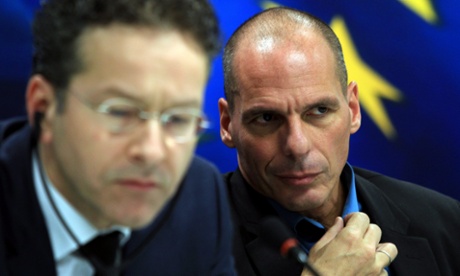
The battle lines between Greece and its creditors were drawn in Athens as the Greek finance minister Yanis Varoufakis announced that the new government would refuse to engage with officials representing the country’s hated “troika” of lenders.
Standing his ground after talks in the capital with the euro group chief Jeroen Dijsselbloem, the finance minister said Greece would not be pursuing further discourse “with that committee.” Nor would it be rowing back on the promises that had got it into power by asking for an extension to its €240bn bailout programme. “This platform enabled us to win the confidence of the Greek people,” Varoufakis told a press conference, insisting that the “logic” of austerity had been repudiated by voters when the far left Syriza party stormed to victory in Sunday’s election.
Meanwhile German finance minister Wolfgang Schaeuble said Germany was open for talks with the new Greek government but would not be blackmailed.
Which drew a predictable response from a Greek government spokesman.
The tensions between Greece and the rest of the eurozone sent the Athens market lower again and hit shorter dated Greek bonds.
Elsewhere Russia cut interest rates unexpectedly while US GDP figures showed the recovery slowing in the fourth quarter.
Earlier came news that the eurozone had fallen further into deflation in January, with prices falling 0.6%, the fastest pace for more than five years.
On that note it’s time to close up for the evening. Thanks for all your comments, and we’ll be back on Monday. Have a good weekend.
Apparently people expect an anti bailout and anti troika party to request a bailout and the return of the troika after 4 days in office
— Philip Dragoumis (@pdragoumis) January 30, 2015
To Potami, the fledgling party which finished in fourth place in the elections with 6.1%, seems unhappy with the day’s events:
To Potami criticizes SYRIZA's approach following Varoufakis-Dijsselbloem meeting #Greece
— Kathimerini English (@ekathimerini) January 30, 2015
A To Potami MP just showcased why they could never be in a coalition with Syriza, as he cheered on Dijsselbloem. pic.twitter.com/jazGVpemX3
— Yiannis Βaboulias (@YiannisBab) January 30, 2015
Updated
The role of British universities in the rise to power of Syriza is examined in a report by my colleagues Ben Quinn and Aisha Gani. Here’s a flavour:
It could easily have been a scene from one of this week’s post-election victory rallies in Greece, as supporters of the victorious Syriza party cheered, surrounded by posters and banners.
Yet the setting was not Athens but central London, where hundreds of the party’s UK branch gathered at the TUC’s headquarters on Wednesday to celebrate Syriza’s election victory alongside peers from the British left and other Europeans energised by Syriza’s feat.
A lesser known story of Syriza’s rise, however, has been the role played by a sizeable number of Greek intellectuals based now or previously at British universities – some of whom have been catapulted from academia to senior positions of power in Greece’s new government.
The full piece is here:
How British universities helped mould Syriza’s political elite
And here’s a short video by Ben of the Syriza victory rally in London.
Greek bonds have been hit by the tensions between the country and its lenders, with three year yields soaring to 19% before easing to close at 18.77%. The five year bond jumped form 13.58% on Thursday to 14.9%.
Greek market closes lower after eurogroup meeting
The Athens market has closed down 1.59% at 721.93. It has been down most of the day but took another lurch lower during the press conference between the eurogroup’s Jeroen Dijsselbloem and new Greek finance minister Yanis Varoufakis, as the tensions between the two sides were laid bare. A late attempt at a recovery could not prevent another negative day.
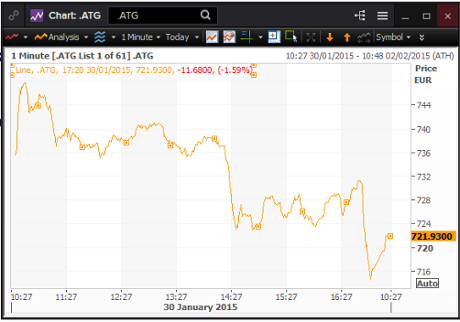
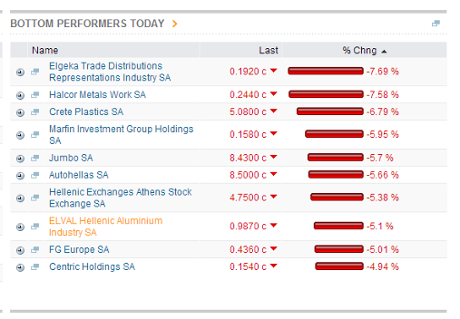
GREECE on dear 3-yr 18.215 + 147 5-yr 14.62 +138 10-yr 10.76 +69.6
— Steve Collins (@TradeDesk_Steve) January 30, 2015
Heading into the close for the Athens market, and it is now down around 1.86%, lower than before the meeting between Dijsselbloem and Varoufakis.
Here’s the Reuters report on the meeting between Dijsselbloem and Varoufakis:
Greece’s government will not cooperate with the EU and IMF mission bankrolling the country and will not seek an extension to the bailout programme, its finance minister said on Friday.
Jeroen Dijsselbloem, head of the eurozone finance ministers’ group who is in Athens for talks with the new government, said the two sides would decide what would happen next before the programme ends on February 28.
“This platform enabled us to win the confidence of the Greek people,” Finance Minister Yanis Varoufakis told reporters after their meeting. “Our first action as a government will not be to reject the rationale of questioning this programme through a request to extend it.”
Varoufakis said he had assured Dijsselbloem that Athens planned to implement reforms to make the economy more competitive and have balanced budgets but that it would not accept a “self-fed crisis” of deflation and non-viable debt.
In turn, Dijsselbloem said he had told the new government to respect the terms of the existing agreement between Greece and the eurozone and warned against taking unilateral steps, saying it was important not to reverse progress made so far.
He said continuing support from Europe depended on Greece respecting its obligations and it was up to to Athens to decide its position before moving forward jointly with the eurozone.
Updated
Back to the press conference between eurogroup finance head Jeroen Dijsselbloem and Greek finance minister Yanis Varoufakis, and Helena Smith says it was a tense affair:
Send off for Joren Dijsselbloem ended with incredible stand-off as Varoufakis socked him one over the troika. The Dutchman looked enraged, bending forward to whisper something in Varoufakis’ ear to which the Greek finance minister did not respond. Greek finance ministry staff standing behind me said “Oh my God.”
One said “I wonder if this is the time to pack my bags.”
Throughout the press conference you could almost feel the electric tension in the air.
Updated
Meanwhile there has been reaction to the comments earlier from German finance minister Wolfgang Schäuble who said Germany was open for talks with the new Greek government – but would not be blackmailed. Reuters again:
The positions of German Finance Minister Wolfgang Schaeuble and his team are well known, Greek government spokesman Gavriil Sakellaridis said in an announcement issued on Friday.
“Also known throughout the world now is the Greek people’s verdict for an exit from the mire of toxic austerity. The Greek government will continue consultations to find a mutually beneficial solution. The real negotiation has begun and it does not concern only Greece or Germany, it concerns the European Union as a whole,” he said.
Updated
Here’s Reuters key points from the press conference:
- Eurogroup head: Greece taking unilateral steps is not the way forward
- Dijsselbloem says up to Greek govt to determine position
- Then we can move forward jointly
- Agreed programme has been extended
- Will decide before programme ends in Feb what will happen next
- Greek FinMin: We don’t have plans to cooperate with Troika mission
The Greek bank index has now turned negative, down 1.2% following the press conference, reports Reuters.
The seeming standoff between Greece and the rest of the EU - no talks with the troika versus unilateralism is not the way and progress made must not be lost - is hitting Greek bonds.
Greece 3.375% 3-Year Bond Yields 18.8%
— MNI Eurozone (@MNIEurozone) January 30, 2015
*GREEK THREE-YEAR NOTES EXTEND DROP; YIELD CLIMBS ABOVE 19%
— Advisory Desk (@advdesk) January 30, 2015
Updated
Eurogroup Dijsselbloem says no to European debt conference. "There is already the Eurogroup," he says #Greece
— Kathimerini English (@ekathimerini) January 30, 2015
And that appears to be that.
Updated
VAROUFAKIS: GREECE WILL WORK WITH EU INSTITUTIONS, NOT TROIKA
— MineForNothing (@minefornothing) January 30, 2015
Greek FinMin Varoufakis: "We will try to convince partners that it is in Europe's interest to design a new agreement" #Greece
— Kathimerini English (@ekathimerini) January 30, 2015
Updated
Varoufakis confirms this standpoint by saying we don’t have any plans to co-operate with the troika mission.
Would you accept the troika as interlocutor? (the new Greek government is reluctant to deal with the creditor representatives of the EU, ECB and IMF).
Their statements have been made, reports Helena, and they are taking two questions only.
* Athens-eurogroup head Dijsselbloem says we agreed programme has been extended - RTRS
— Fabrizio Goria (@FGoria) January 30, 2015
He says it is up to the Greek government to determine its position, then we can move jointly forward.
Updated
Dijsselbloem says we want Greece to regain economic independence, it is important not to lose the progress made these years in Greece (quote from Reuters).
#Greece Dijsselbloem: Unilateral actions aren't progressive steps
— Efthimia Efthimiou (@EfiEfthimiou) January 30, 2015
Varoufakis says:
We have just had get to know you talks that I am sure will form a productive and effective for the interests of Greece and the eurozone.
I impressed upon him our determination to forge ahead with reforms without fear or passions, reforms that have been needed for years.
The press conference between eurogroup President Jeroen Dijsselbloem and Greek finance minister Yanis Varoufakis is underway.
Slight delay while Dijsselbloem sorts out translation problems, says Helena Smith who is there. Varoufakis offers to translate.
She says the eurogroup head looked annoyed when he walked in while Varoufakis looked upbeat.
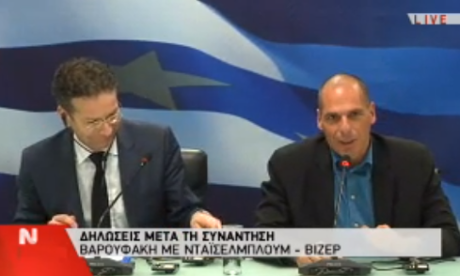
Updated
European markets are down.
Investors are weighing up weaker-than-expected US GDP and deeper eurozone deflation, and await the outcome of talks between the Greek finance minister and Eurogroup chief.
- FTSE 100: -0.4% at 6,782.35
- France’s CAC: -0.8% at 4,595.74
- Germany’s DAX: -0.6% at 10,669.93
- Spain’s IBEX: -0.6% at 10,444.2
- Italy’s FTSE MIB: -0.6% at 20,474.47
- Greece’s ATG: -1.3% at 723.93

Cheese sandwich anyone? Croissant?
Paul Ashworth, chief US economist, at Capital Economics, says the slowing US economy in the fourth quarter is nothing to worry about.
The 2.6% annualised gain in fourth-quarter GDP was slightly below the 3% consensus forecast but, following the breakneck 5% gain in the third quarter of last year, this slowdown is nothing to worry about.
The fourth-quarter gain was driven by a very strong 4.3% annualised increase in consumption. With the collapse in energy prices increasing households’ purchasing power, we expect strong consumption growth to continue driving GDP growth in the first half of this year. We expect GDP growth for 2015 as a whole to be 3%.
US recovery slows in fourth quarter
The US economy grew at an annual rate of 2.6% between October and December, following growth of 5% in the third quarter.
That was below expectations of a 3% increase in gross domestic product.
The US commerce department said a drop in government spending and business investment was a drag on growth, while consumer spending - which accounts for more than two-thirds of the US economy - increased by 4.3%.
Dijsselbloem has also been posing for the cameras in Athens with the Greek finance minister Yanis Varoufakis. Still looking cheery.
The press conference is scheduled to begin at 14.30 UK time.
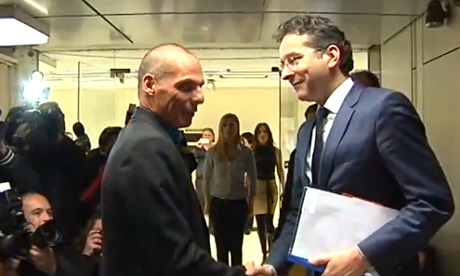
The first pictures of the meeting between the eurogroup President Jeroen Dijsselbloem and Greek PM Alexis Tsipras have emerged on Greek television.
They’re looking fairly cheerful in front of the cameras.
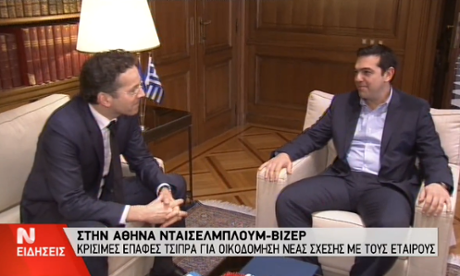
Updated
Russia surprises with rate cut
Russia has taken markets by surprise, cutting interest rates a month after raising them.
The central bank cut the main rate by two points to 15% as fears of a deep recession mount following the oil price slump and western sanctions over Ukraine.
A little over a month ago, the bank pushed rates up 6.5 points to 17% after a run on the rouble.
Back in Greece...
Eurogroup president @J_Dijsselbloem arrives at Finance Ministry to meet @yanisvaroufakis. In car, not on back of FinMin's motorbike #Greece
— Nick Malkoutzis (@NickMalkoutzis) January 30, 2015
Meanwhile, the German finance minister Wolfgang Schäuble said Germany is open for talks with the new Greek government – but won’t be blackmailed.
He also said the Greek government knows it has to take action quickly. Noting that Europe had already pushed its generosity to Greece to the absolute limit, Schäuble told representatives of the insurance industry in a speech in Berlin:
We need solidarity in Europe, and besides we cannot be blackmailed.
He said Germany is ready to talk with Greece about its debt problems but the basis for these discussions cannot be changed. He added that agreements in Europe only make sense if they can be relied on.
Dijsselbloem arrives in Athens for talks
And we’re off. Jeroen Dijsselbloem, the eurozone finance chief, has arrived in Athens for talks with the new Greek government.
From Athens, the Guardian’s Helena Smith says the eurogroup president is expected to be with prime minister Alexis Tsipras for no more than 30 minutes. After that he moves onto talks with the new finance minister Yanis Varoufakis.
Eurogroup chief @J_Dijsselbloem arrives at Prime Minister's office in Athens to meet with @atsipras #Greece
— Nick Malkoutzis (@NickMalkoutzis) January 30, 2015
Read our full story on eurozone deflation here.
The eurozone descended further into deflation in January, with prices falling 0.6%, the fastest pace for more than five years amid tumbling global oil prices.
The annual drop in prices across the single currency bloc was bigger than economists had been expecting and matched a record fall set when the eurozone was mired in recession in July 2009.
The French prime minister, Manuel Valls, is in China and trying to ease concerns there about a potential Greek exit from the eurozone.
Greece will remain, must remain in the eurozone. The new Greek prime minister has said, it cannot be any other way.
We must help Greece out of the crisis she faces. But at the same time Greece must respect its commitments, that is how the European Union works.
Pushing for greater trade links between China and Europe/France, he told a Chinese business audience:
I know there are some concerns that relate to the situation of the eurozone or Europe , which remains a major trading partner.
Discussions are constantly taking place between China and the European Union, so come and invest in Europe, and in France in particular.

The poker game approach over the Greek debt deal continues between Germany and Greece.
A spokesman for the German finance ministry has said an extension of Greece’s bailout programme only makes sense if Greece wants to implement reforms.
Speaking at a German government press conference, Martin Jaeger, said:
The reality is simple - at the end of February an aid programme expires which in order to have an orderly ending, needs extra efforts by Greece.
If some of the new measures announced by the new Greek government are put into practice, then we need to ask if the programme is being substantially put into question.
We are prepared to work further with Greece. But we will not force our help onto Athens.
Announcements so far from Athens appear to go in the other direction [away from reforms].
Now back to Greece, where finance minister Yanis Varoufakis has arrived on a 1300 CC Yamaha bike for a meeting with his boss, PM Alexis Tsipras.
No picture sadly, but Helena Smith, the Guardian’s correspondent in Athens, brings us this report:
Finance minister Yanis Varoufakis has again turned heads arriving for talks with the Greek prime minister Alexis Tsipras on a giant 1300 CC Yamaha bike.
The two men are conferring ahead of their meeting with Euro group president Jeroen Dijsselbloem. If any proof were needed that Greece has entered a new era, this was it.
Its far removed from anything Greeks have seen to date and reconfirms the growing suspicion that Yanis Varoufakis is the coolest politician the country now has. Yesterday, as he arrived for his first day behind his desk at the finance ministry, he was mobbed by breathless mobile camera wielding schoolgirls.
#Greece New fin min Yanis Varoufakis turns up 4 talks w new pm Alexis Tsipras on giant 1300 CC motorbike - a new era has indeed begun!
— Helena Smith (@HelenaSmithGDN) January 30, 2015
Some good news from Spain, where economic recovery accelerated in the fourth quarter of 2014.
The economy grew by 0.7% between October and December, following growth of 0.5% in the third quarter. Economists polled by Reuters were forecasting a smaller rise, at 0.6%.
#Spain Q4 GDP +0.7% qq tops expectations and the top end of @ReutersPolls f'cast range http://t.co/oy2xOPRupf pic.twitter.com/mdvJ6CiJnC
— Ross Finley (@rossfinley) January 30, 2015
Reaction to this morning’s eurozone data on inflation is coming in. The region sank deeper into deflation in January with an annual inflation at -0.6%.
Christian Schulz, senior economist at German bank Berenberg:
Eurozone prices made the expected deep dive into deflationary territory in January.
The sharp fall in inflation poses a risk to inflation expectations, which had already been under pressure due to the huge amount of slack in the economy and the slow pace of the recovery.
The ECB was thus more than justified in taking aggressive action earlier this month. The multi-stimulus of cheap oil, a weak euro and aggressive monetary easing is now stabilising expectations and will help the ECB reach its price stability target over time. However, to fully benefit from the ECB’s stimulus, countries need to their structural reform homework.
Teunis Brosens, economist at ING:
Today’s inflation report provides strong justification for the ECB’s recent decision to embrace QE. Lower oil prices pushed headline Eurozone inflation further into negative territory. At the same time, core inflation fell to an all-time low.
Today’s inflation numbers fully vindicate the ECB’s decision to embark on QE. That said, QE will not raise inflation in the coming months. Unless oil prices stage a quick recovery, the energy component will keep headline inflation well below zero in the months ahead.
But the key number to watch in the coming months is core inflation. Any further falls may raise concerns that QE has come too late to stave off deflation.
Jonathan Loynes, chief European economist at Capital Economics:
January’s eurozone consumer prices figures have brought further evidence that deflationary pressures in the currency union go well beyond the effect of falling energy prices.
The key news here is that core inflation – which excludes both energy and food prices – fell from +0.7% to +0.5%, a new record low.
The drop in core inflation almost certainly reflects the continued weakness of demand in the euro-zone economy, and the associated vast amount of spare capacity.
With growth likely to remain too weak to erode spare capacity to any significant degree, core inflation could continue to drop, raising the risk that deflation persists even after downward energy effects begin to fade.
Eurozone unemployment dips unexpectedly to two-year low
The eurozone unemployment rate fell unexpectedly to 11.4% in December from 11.5% in November. It was the lowest in more than two years, since August 2012.
Economists were expecting no change to the rate as the region continues to struggle with a sluggish economy and high levels of debt in some countries.
Large disparities between countries remain. The highest rates are in Greece at 25.8% (October figure) and Spain at 23.7%.
The lowest rates are in Germany, at 4.8%, and Austria, at 4.9%.
The number of unemployed people in the eurozone was 18.1m in December.
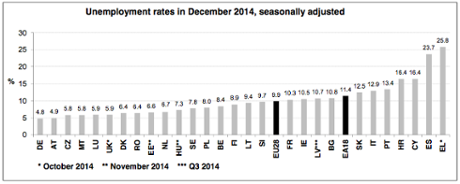
Youth unemployment also fell slightly but remains high, with a jobless rate of 23% in December, compared with 23.2% in November.
There were 3.29m people under the age of 25 out of work in the eurozone in December.
Eurozone inflation of -0.6% in January was lower than economists were predicting (-0.5%) and throws further weight behind the European Central Bank’s decision last week to announce a €1.1tn programme of quantitative easing.
The big drag on prices was energy, down 8.9%, but food, alcohol and tobacco prices were also down by 0.1%.
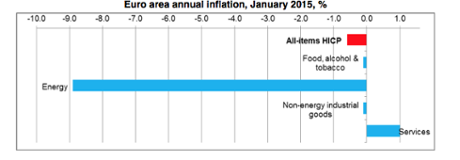
Core inflation, stripping out energy, food and tobacco, fell to 0.5% from 0.7% in December.
#Japanification of #Eurozone continues. Euro area CPI falls 0.6% on year vs 0.5% drop expected. pic.twitter.com/ZMZkjNDAJL
— Holger Zschaepitz (@Schuldensuehner) January 30, 2015
Eurozone sinks deeper into deflation
Breaking: Eurozone inflation falls to -0.6 in January, from -0.2% in December.
The US will co-operate closely with the Greece, according to a White House spokesman quoted by Reuters.
Josh Earnest, assistant to the President and White House Press Secretary:
We will continue to work closely with the Greek leaders and the Greek people to implement policies that are in the interest of the country and the interests of the wider European and global economy.
Earnest said there was no announcement to make on the possibility of the Greek PM visiting the US to meet President Obama in the near future.
But he did give some (limited) insight into the details of a telephone conversation between Tsipras and Obama.
The President made clear that we will continue to co-operate closely with the Greek leaders and the Greek people aiming at implementing policies that are in the interest of the country, and the interest of the wider European and global economy.
Away from Greece, the flash estimate for eurozone inflation for January will be published at 10am UK time.
Economists are forecasting prices fell at a faster pace in January, with annual inflation of -0.5% compared with -0.2% in December.
If correct, the deeper fall into deflation will appear to further justify the European Central Bank’s decision last week to finally push the button on sovereign bond buying (quantitative easing). We shall see.
Unemployment data published also published at 10am is expected to show the eurozone jobless rate was flat in December at 11.5% (but with huge country variations as ever).
We will bring you the data and reaction as it happens.

Greek finance minister Yanis Varoufakis has waded into the debate over whether Greece is delaying agreement on imposing further EU sanctions on Russia over Ukraine.
Muddying the water further, Varoufakis claims Greece has not been consulted on fresh sanctions, so any comments made on the subject do not amount to a Greek veto.
Writing his own personal blog, entitled A question of respect (or lack thereof)… – the Greek veto over Russia that never was , he said:
On the first day in our ministries, the power of the media to distort hit me again. The world’s press was full of reports on how the Syriza government’s first foreign policy ‘move’ was to veto fresh sanctions on Russia.
Now, I am not qualified to speak on foreign affairs but, nonetheless, I must share this with you at a personal level. Our Foreign Minister, Nikos Kotzias, briefed us that on his first day at the job he heard in the news bulletins that the EU had approved new sanctions on Russia unanimously.
The problem was that he, and the new Greek government, were never asked! So, clearly, the issue was not whether our new government agrees or not with fresh sanctions on Russia. The issue is whether our view can be taken for granted without even being told of what it is!
From my perspective, even though (let me state it again) I am certainly not qualified to speak on foreign affairs, this is all about a question of respect for our national sovereignty. Could journalists the world over try to draw this important distinction between protesting our being neglected from protesting the sanctions themselves? Or is this too complicated?
The Greek government should be readying itself for some tense discussions with Jeroen Dijsselbloem, eurozone finance chief, this afternoon.
Speaking in Amsterdam before he left for Athens, Dijsselbloem suggested it would be impossible for Tsipras and Syriza - his radical left party - to stick to all their pre-election promises.
In all honesty, if you add up all the promises, then the Greek budget will very quickly run totally off course.
Greek shares rise
Greek shares are also up slightly, with the ATG index up 1.1% at 741.58.
Banking shares are up sharply, adding to the 12.9% rebound on Thursday following heavy losses earlier this week.
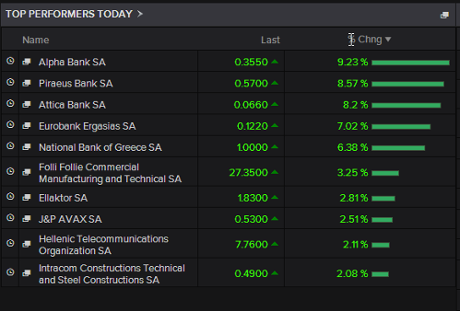
European markets open higher
European shares have opened slightly higher this morning, following a late rally on Wall Street last night.
- FTSE 100: +0.03% at 6812.56
- France’s CAC: +0.6% at 4657.2
- German DAX: +0.5% at 10787.2
- Spain’s IBEX: +0.5% at 10,564
-
Italy’s FTSE MIB: +0.1% at 20,610.59
Updated
Just as Greece is trying to win friends and influence people, it appears to be ruffling a few feathers in Europe over Russian sanctions.
Reports last night suggested the Greek government was picking its first fight with the EU by delaying agreement on further sanctions against Russia.
Nikos Kotzias, the new Greek foreign minister, said Greece wanted to “prevent a rift” between Russia and the EU. He later added: “We are not against every sanction. We are in the mainstream, we are not the bad boys.”
The development is likely to stoke fears that Russia will seek to capitalise on potential divisions between Greece’s new anti-austerity coalition government and the rest of Europe.
Martin Schulz, president of the European parliament, is not happy. Fresh from his meeting with Greek PM Tsipras on Thursday, he said Greece should not undermine EU policy on Russia at a time when it is seeking support from its partners over its own situation.
Schulz told Kathimerini newspaper:
I was surprised by the statements that were made and the fact that the Greek government looked ready to abandon the common EU line on Russia .
It is difficult on the one hand to expect a revised common approach to one’s country, and on the other to be differentiating from the others, particularly as the first move after taking office.
Ouch.
CNN posited the view that Greece could be Vladimir Putin’s new ally in Europe: http://t.co/WShRLACtBG #bbcqt pic.twitter.com/yYSJR57AUP
— BBC Question Time (@bbcquestiontime) January 29, 2015
Good morning, and welcome to our rolling coverage of the Greek election, and other key developments across the financial markets, the world economy, the rest of the eurozone, and business.
The main event of the day in Athens should be the meeting between the Greek PM Alexis Tsipras, his finance minister Yanis Varoufakis, and Jeroen Dijsselbloem, the head of the eurozone group of finance ministers.
This is where the negotiations over Greece’s future begin. The two sides will hope to find some common ground, but Tsipras and his anti-austerity cabinet have already proved they mean to carry out their pre-election promises, reversing public sector job cuts and planned privatisations.
The meeting is scheduled for 16.30 in Athens (14.30 UK time). We will have live updates here.
Friday in the afternoon in Athens meeting PM Tsipras, vPM Dragasakis, Mins Varoufakis and Stathakis, co-Min Tsakalotos. (1/2)
— Jeroen Dijsselbloem (@J_Dijsselbloem) January 29, 2015
+/- 4.30 (Greek time) short press statement Dijsselbloem and Varoufakis at Greek FinMin. Accreditation through Greek FinMin. (2/2)
— Jeroen Dijsselbloem (@J_Dijsselbloem) January 29, 2015
It will kickstart a round of talks between Varoufakis and his counterparts across Europe, as Greece tries to build support for a renegotiation of its debt deal and the terms of its bailout programme.
On Sunday, Varoufakis will travel to London to meet the chancellor, George Osborne, before heading to France, Spain and Italy to meet finance ministers there.







